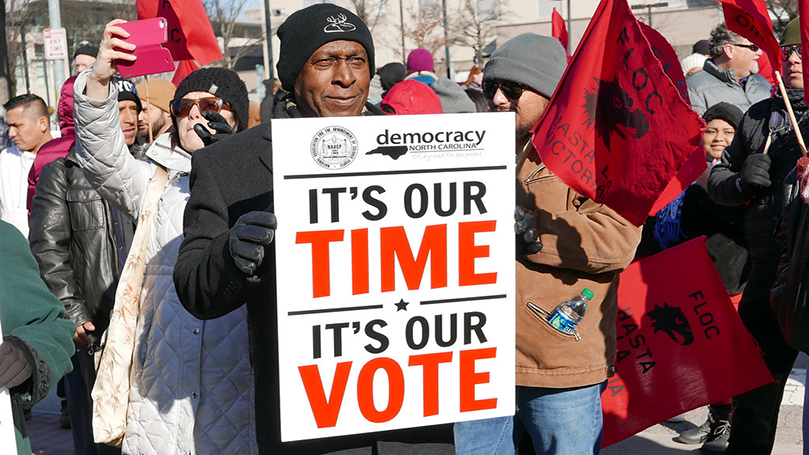
The following is based on a report given by Joe Sims and adopted by the National Committee on Feb. 13, 2022.
It’s been little over a year since Trump’s assault on the Capitol, and while the coup failed, everyone knows the danger is far from over. Since that terrible day in January, Trump’s forces have been busy holding rallies, raising money, organizing truckers to wreck the economy, terrorizing students at historically Black colleges with bomb threats, and passing voter suppression legislation. So far some 34 states have passed laws restricting the right to vote. Make no mistake: the extreme right has its eyes on the prize of the midterm elections. One can only imagine what’s in store for the country should they win.
A question arises: just what is the Republican Party becoming? Has it been completely captured by national chauvinists, authoritarians, white supremacists, and neo-fascists? Or does it remain a coalition with center-right forces and if so to what degree? An answer was provided by the National Committee of the GOP itself the other day when they declared that January 6th was “legitimate political discourse.” There you have it: the Trump forces are now normalizing insurrection, normalizing counter revolution and armed right-wing revolt.
And while it’s true that debate inside the GOP remains ongoing, with McConnell, along with Pence, Cheney, and Romney, pushing back against the tide, it’s also true that today they are but minnows in a sea of sharks.
Now this isn’t the first time the country’s been surrounded by sharks. But the situation since January 6th is at an entirely new level — the question is what to do about it?
Our history suggests, as the National Committee knows, that the first thing that must be done when surrounded by fascist sharks is to cast a wide net — a net wide enough and strong enough to yank these sharks out of the water.
And if you think about it, that’s what the all-peoples electoral front and vote is: a net of collective action wide enough and strong enough to yank fascist sharks out of the water.
This collective unity of action is stitched together in voter registration drives, fundraising initiatives, rallies, occupations, door knocking, picket lines, phone banking, and get-out-the-vote efforts. It’s woven in the process of contacting neighborhood associations, PTAs, lodges, women’s rights groups, and environmental organizations along with reaching out at grocery stores, bars, pool halls, barber shops, beauty salons, dry cleaners, and county fairs. And it’s sewn into an unbreakable thread by demonstrating, sitting in, and writing letters to the editors, outlining the issues and supporting candidates who back them — including when possible our own party candidates.
In our opinion, workers have to lead this effort. And where they’re not leading it, the Communist Party has to fight for such leadership — that’s our “plus,” that’s the role we have to play.
Thus, we should have no fear of working in broad coalitions. In fact, in this situation, the broader the better. What we’re afraid of is what happens when we lose sight of fighting for working-class leadership of these coalitions.
While advancing the cause of working-class leadership, narrow, sectarian approaches should be avoided at all costs. This electoral coalition is not a united front of the left or Marxist groups — that’s not what Lenin, Dimitrov, or Gus Hall was talking about. Rather, what was advocated was a unity of action of the broad masses based on the issues. What issues? Issues like ending racist police murder, voter suppression, health care, cancelling student debt, and stopping the drive towards war.
Unity of action should be bound only by the issues themselves — let these be the only preconditions for working with others. Here, the smaller the number of issues, the wider is the possibility for joint action and initiative.
There have been calls in some quarters to set up a formal “united front against fascism.” But the people’s front is not a meeting. It’s not a convention or an event with a specific starting date and end time. Rather, it’s the living, breathing movement of the people that ebbs and flows according to need. This front was in the streets protesting George Floyd’s and Breonna Taylor’s murders; it was in the voter registration drives during the uprising. And afterwards it was in the march to the ballot boxes and everything that had to do with fighting Trump’s attempt to seize power.
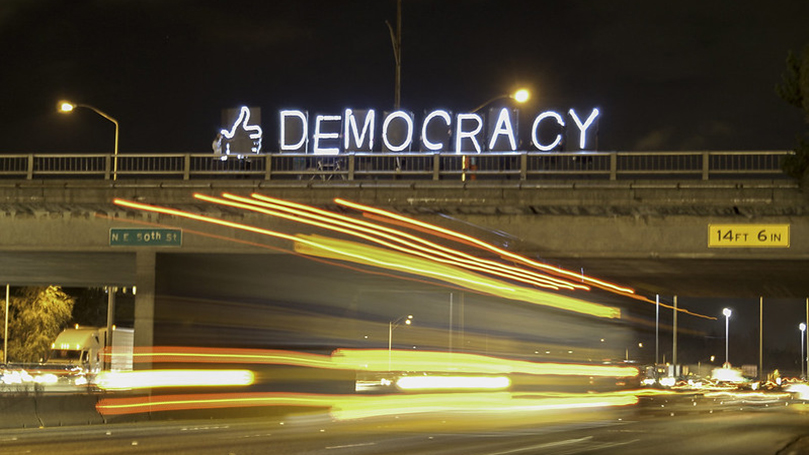
And when we say everything, we mean every little thing, from op-eds in the People’s World and the New York Times, to the anti-Trump initiatives taken in the headquarters of the AFL-CIO, community organizations, and yes, even some corporate boardrooms.
And that’s what’s needed today. In this connection, fighting the GOP’s voter suppression efforts has to be a top priority. In states where we have party organization, it’s so important to get connected with the civil rights and voting rights organizations that are fighting back.
In some states, like Florida and Texas, the fight is in the courts. Is that enough? In Georgia there’s a well-developed mass voting rights movement underway. It’s an effort worth studying. Did you know that several years ago, there were over 1 million unregistered voters in Georgia? Today, 95% of all those eligible to vote are on the rolls. That’s what Stacey Abrams and Co. accomplished. And if you can do that on the red clay of Georgia, you can do it anywhere.
This fight against voter suppression is not an issue for red states or swing states alone. If you’re living in a “safe” state, you might think creatively about how to lend solidarity to states and cities where voting rights are under attack. This might include setting up a picket line at a business supporting right-wing candidates or even stopping in for a friendly visit. Participating in phone banking efforts is another possibility. How about hanging a banner from a highway bridge? Last weekend, young communists from Ohio and Indiana joined with comrades in Chicago by picketing at Blackrock’s Chicago headquarters in support of striking Alabama coal miners. It was a great initiative – now let’s broaden it.
Our election work, wherever possible, should reside with what we call the “forces of political independence,” that is, organizations and movements that operate independent of the Democratic Party. Most unions, for example, have their own phone banks, fundraising efforts, and get-out-the-vote drives. The same is true for Indivisible, Move On, DSA, and others. Working with them is a great way to get to know people and build relations.
On the other hand, sometimes election work is going to involve working with Democratic campaigns, and there’s nothing wrong with that. In this respect our longtime position has not changed: we work both with and outside Democratic Party campaigns. Yes, it’s a capitalist party. But it’s a party where the majority of the working class, people of color, women, etc. carry on their political activity. As Joelle Fishman, chair of our Political Action Commission recently said, “The Democratic Party is not a monolith. What occurs at the local level is not necessarily what transpires in the Democratic National Committee.”
And let’s be real: in this election, the choice is between working in this way on the one side because there are sharks on the other side — there is no middle ground. In fact there’s no ground at all — there’s only water — and there’s blood in it.
This is why our Vote Against Fascism slogan in 2020 was so important. We called it! We gave it a name, and we did so when nearly everyone else was equivocating. “Oh, Trump’s not ideological,” some said. “Well, it’s more of a variety of illiberal democracy,” others opined. Still others insisted on calling it “authoritarianism,” whatever the hell that means.
Now we caught a little flack for it. Some thought Vote Against Fascism exaggerated the danger; others, mainly on the internet left, but also some within the party, argued that it’s an illusion to think you can fight fascism by only casting a ballot. However, we never made any such argument.
Our position has always been that this fight in the first place has to be carried out on the basis of the day-to-day issues facing the class, in the course of which we must use all of the tools in the toolbox — including voting.
And yes, this includes fielding our own candidates. We should not shy away from it. The socialist moment has not disappeared: if anything, the mass radicalization process has only deepened. Let’s never forget that capitalism is in deep crisis and there’s mass dissatisfaction with both parties — it’s true. And now’s the time to step into that breach. Let the discussion begin, and let’s run where we can at the local level: for school boards, community boards, city councils, and county commissioners, etc.
The coming midterm election is going to be very difficult. And there’s no doubt that it will be an uphill fight. Why? Because the situation in the country is very unstable. Unstable and uncertain. Indeed, uncertainty has become a material force. The Omicron virus is one of the major reasons — with over 40% of the U.S. population unvaccinated, there’s no telling when a new variant may emerge.
And then there’s the crisis of everyday living faced by our working class. While unemployment is lower, increases in wages are almost completely outpaced by inflation. As a result, workers are continuing to strike when they can and resign when they just can’t take it anymore.
Then, the Democratic platform in Congress is stuck, with everything from human infrastructure to voting rights hanging in the balance due to the obstructionism of Republicans and two Democratic senators. And here the apparent lack of initiative on the part of the Biden administration on issues like voting rights isn’t helping.
As a result, the mood in sections of the democratic electorate is souring. Particularly when nothing seems to change. Take the issue of police murder. Cops shot over 1,055 people last year, the highest number since tracking began despite the mass uprisings almost two years ago.
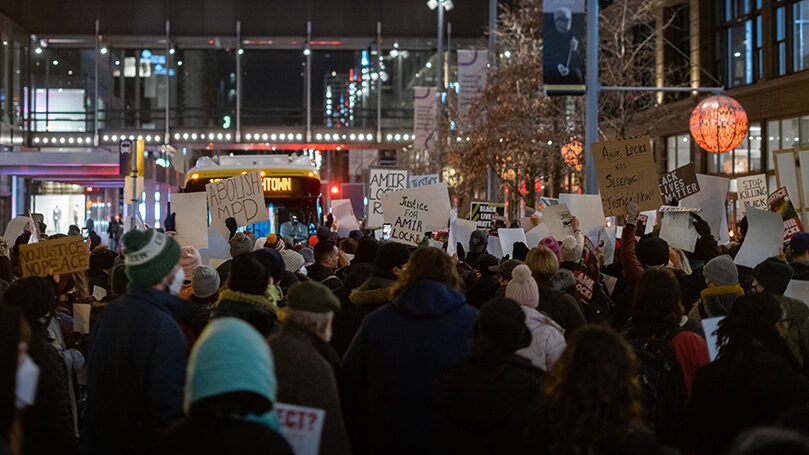
And in Minneapolis last week, the murder of yet another African American man, Amir Locke, rocked the city once again. Mass protests there have occurred, and high school students walked out and occupied the state capitol.
Despite these protests, the cop who pulled the trigger and acting police chief have not been fired, key demands of the protests.
Worker strikes over the past months and the beginning of yet another uprising in Minneapolis demonstrate that our class and people are fed up and ready to fight, but with few exceptions leadership at the national level has been sorely lacking. What we’ve called a “crisis of inaction” is continuing.
And it’s not lost on us that this is potentially a very dangerous situation when it comes to questions of war and peace.
In this regard, bipartisan support for imperialism’s Cold War policies toward China, saber-rattling at Russia, and ongoing hostility toward Cuba and Venezuela are adding to the crisis and heightening the fascist danger.
The Biden administration is making a big mistake if they think warmongering and selling wolf tickets are going to help them keep a majority in the House and the Senate. They’re dead wrong. The American people want peace and an end to the U.S. acting like the world’s top cop.
Our fight for a progressive domestic policy must be coupled with an equal fight against an imperialist policy abroad. We say, no expansion of NATO and no deployment of troops. Diplomacy and peace must prevail.
There is no doubt that the U.S. push to bring Ukraine into the military alliance has heightened tensions. Russia in response has its own national designs. The outbreak of war will only make matters worse, especially for the national minorities in the region.
Our response must be unequivocal: the U.S. must stay out of the crisis!
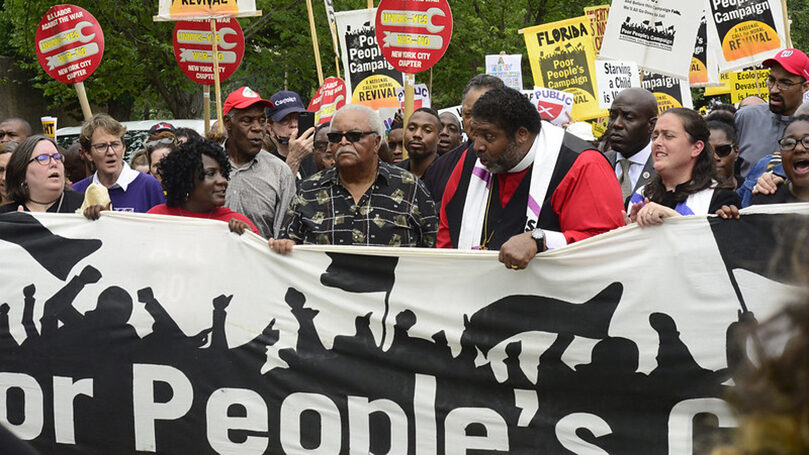
One of the best ways to address these issues will be by participating in the Poor People’s Campaign Moral March and Low-Wage Worker Assembly on June 18th. The Poor People’s Campaign is one of the exceptions to the ongoing crisis of inaction with respect to the bills in Congress and the necessary street heat on the ground to support them.
In light of what’s happening in the country, the importance of this march grows by the day.
Let’s join together with others and have a big presence at the D.C. march. Can we bring 500 to march under our banner in DC? Yes we can!
And speaking of 500, did you know that 550 people joined the party last month? Some 3,000 have joined since September. It keeps growing. Nearly 1,000 of that number have paid dues.
And our comrades are active! We’ve been busy: on the picket lines of the Kellogg’s and Nabisco strikes, organizing in Amazon warehouses, marching for voting rights in D.C. and for women’s right to choose, organizing solidarity for striking coal miners, demanding justice for Amir Locke, and walking the line with striking graduate students at Columbia University in New York.
Our young communists have oftentimes been helping lead these efforts, pushing us forward, taking it to the streets, giving the party visibility and life.
Our People’s World staff has been covering these events and more day in, week out, with a reduced staff but heightened determination to get the job done.
On behalf of the National Committee, we want to thank you for all you’ve done. We’ve got a tough road ahead, but we’re gonna get there. And in the process we’re going to build this party to be the robust fighting revolutionary organization that it needs to be — that it must be to help fulfill our class’s historic mission.
Images: Voting rally, Susan Melkisethian (CC BY-NC-ND 2.0); Democracy sign, Backbone Campaign (CC BY-NC-SA 2.0); Amir Locke rally, Chad Davis, Wikipedia (CC BY 2.0); Poor People’s Campaign, Stephen Melkisethian (CC BY-NC-ND 2.0).

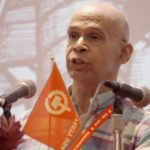
 Join Now
Join Now